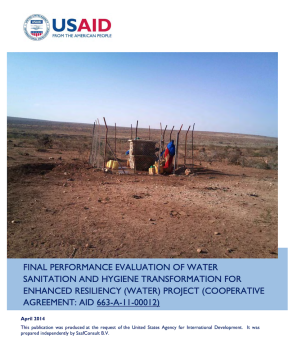Final Performance Evaluation – Water Sanitation and Hygiene Transformation for Enhanced Resiliency (WaTER) Project
Pastoralist communities in Ethiopia exhibit some of the lowest water and sanitation coverage rates in the world. In order to contribute towards alleviating the prevailing water and sanitation problems, USAID/Ethiopia designed a three-year and four months (September 6, 2011-March 31, 2014) Water Sanitation and Hygiene Transformation for Enhanced Resiliency (WaTER) Project with a total budget of almost $8 million. The project was implemented by a consortium formed by the International Rescue Committee (IRC) and CARE Ethiopia including other local organizations. Building on considerable water, sanitation, and hygiene (WASH) experience in conflict-prone pastoralist areas, the WaTER project contributed significantly to improving pastoralists' access to clean and sustainable water sources, hygiene awareness and access to sanitation, and rangeland management practices.
The overriding purpose of this evaluation was to gain an independent view of the performance of the project to draw lessons for future USAID-financed similar projects and share the lessons for other development partners. The scope of work of the evaluation included a visit to each region (Afar, Somali and Oromya) in which two project sites in each region were to be visited. This amounted to six projects sites visited out of forty-one sites in 13 days in the field and 4 days in Addis.
The evaluation team sought to answer these questions:
- What were the project's contributions towards meeting the development objective of economic growth
- How effective was the project in achieving its anticipated results
- How effective was the project in mainstreaming gender issues and addressing the needs of people with disabilities
- How was the project's approach and methodology designed to achieve project objectives
- What worked well and what did not work [and] how [and] why?


